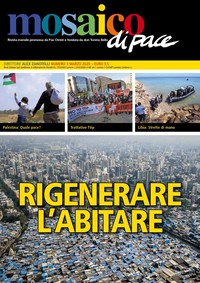Dieci Anni dopo: commemorazione degli attacchi del 11/9/2001
Dieci anni fa il mondo fu sconvolto dagli eventi orribili accaduti negli USA. Circa 3000 civili rimasero uccisi nei violenti attacchi messi in atto dall’organizzazione terroristica Al Qaeda. L’impatto degli attacchi sulla comunità internazionale è stato senza precedenti, anche perché la comunità mondiale è stata testimone di quei tragici momenti.
Quale conseguenza immediate, il Presidente George Bush Junior annunziò a chiare lettere una serie di severe misure di sicurezza e rappresaglia: gli USA erano in guerra contro il terrorismo internazionale e determinati a vincere la battaglia. Molti Stati si unirono agli USA, rinforzando i propri sistemi di sicurezza e dei servizi segreti, ma non si riuscì ad evitare i sanguinosi eventi di Bali (2002), Madrid (2004) e Londra (2005)
Oggi gli attacchi del 11 settembre sono distanti 10 anni da noi. L’epoca della “guerra globale al terrorismo” che ha dominato la scena mondiale è finita. Al Qaeda ha perso molta della sua forza e rappresentatività. Tuttavia, nessuno può dichiarare che la guerra al terrorismo sia stata un successo. Piuttosto, ha indebolito e consumato i nostri valori più elevati. Pax Christi International condanna questa erosione dei valori democratici e la riduzione delle libertà per ragioni di lotta al terrorismo.
Le leggi che sono state promulgate e le misure prese negli ultimi dieci anni, hanno limitato i diritti umani e violato la legge stessa, dato l’uso di prigioni segrete, il ricorso alla tortura ed alla detenzione preventiva a tempo indeterminato. Non più tardi del 2006, le Nazioni Unite hanno dichiarato i diritti umani come uno dei 4 fondamenti della strategia globale contro il terrorismo.
Gli interventi militari degli Stati Uniti in Iraq, Afghanistan e Pakistan, spesso basati su decisioni unilaterali, hanno provocato sofferenze profonde ed alienato le classi politiche. Questi sviluppi hanno fatto il gioco dei movimenti terroristici nel promuovere sentimenti anti occidentali. È fondamentale ricordare che terrorismo e violenza armata in Iraq, Afghanistan o Pakistan hanno provocato danni maggiori di quanto non abbiano fatto gli attentati negli USA del Settembre 2001.
Manifestazione di questo approccio controproducente è l’uso in operazioni segrete dei droni, aerei senza pilota usati sempre più frequentemente per eliminare persone sospettate di terrorismo in Afghanistan e Pakistan. La legalità di queste operazioni è sicuramente discutibile perché possono essere interpretate come esecuzioni senza processo. Inoltre tali operazioni vengono messe in atto senza consultare le nazioni interessate, costituendo di fatto una violazione del principio di sovranità degli Stati. Persino il comandante in capo dei servizi segreti statunitensi, Dennis Blair ha recentemente criticato l’uso dei droni perché lesivi dell’immagine degli USA in stati come lo Yemen, Afghanistan, Somali o Pakistan.
Dieci anni dopo gli attacchi terroristici del 11 settembre 2001. Il terrorismo internazionale nell’accezione conferita da Al Qaeda alla fine degli anni ’90 si è indebolito, ma non è chiaro quale sarà l’impatto a lungo termine della cosiddetta guerra al terrorismo. Negli ultimi 10 anni soltanto gli USA hanno speso più di 1.2 trilioni di dollari nelle strategie anti terrorismo e nelle guerre contro Afghanistan e Iraq.
Nel frattempo, gli eventi recenti hanno dimostrato che anche i cittadini del mondo Arabo a lungo stigmatizzato, hanno, come quelli occidentali, iniziato a lottare per un mondo libero da oppressioni e paure, un mondo caratterizzato dalla giustizia economica e sociale e dalla eliminazione della povertà.
Pax Christi International richiama la comunità internazionale affinché operi ogni sforzo per aiutare la gente a riappropriarsi dei legittimi desideri e aspirazioni. È questa l'unica soluzione per rimuovere il terreno che alimenta le incomprensioni e la violenza. Pax Christi ritiene che la violenza non sia la risposta alla violenza. Piuttosto, prevenire la violenza e le metodiche della difesa non violenta devono divenire più di prima le priorità di ogni azione politica.
Brussels, 11 Settembre 2011
========================
ORIGINAL VERSION
========================
Ten Years later: commemoration of the 9/11/2001 attacks
Ten years after the attacks of September 11, 2001
Ten years ago the world was shocked by the horrific events in the United States. Almost 3000 civilians died in the violent attacks executed by the terrorist organization, Al Qaeda. The impact of the attacks on the global community was unprecedented, in part because people worldwide directly witnessed the dramatic events.
In the immediate aftermath, President George Bush Jr. announced in strong words a series of tough security and retaliation measures: the U.S. was at war with international terrorism and was determined to win the battle. Many states followed the U.S., reinforcing their security and intelligence capabilities, but deadly terrorist acts were not prevented in Bali (2002), Madrid (2004) and London (2005).
Today the attacks of 9/11 are 10 years behind us. An era when “the global war on terror” dominated the international political scene has passed. Al Qaeda has lost much of its strength and relevance. Yet, no one could declare the war on terror to have been a success. Rather, it has weakened and eroded our highest values. Pax Christi International mourns this erosion of our democratic values and diminishment of our liberties for the sake of counter-terrorism.
Laws have been enacted and measures taken in the last decade that have limited human rights and violated the rule of law, including the use of secret prisons, torture and unlimited preventive detention. As recently as 2006, the United Nations called human rights one of the four foundations of a global counter-terrorism strategy.
U.S. military interventions in Iraq, Afghanistan and Pakistan, often based on unilateral decisions, have caused deep suffering and have alienated the political classes. These developments have played into the hands of terrorist movements promoting anti-Western sentiments. It is crucial to remember that terrorism and armed violence in Iraq, Afghanistan or Pakistan have caused many times more casualties than were perpetrated in the U.S. in September 2001.
Illustrative of this counter-productive approach are the secretive operations executed by drones, unmanned aircraft increasingly used to eliminate terror suspects in Afghanistan and Pakistan. The legality of these operations is highly questionable as they can be seen as executions without trial. In addition, these operations take place without the consent of the countries concerned, therefore constituting a violation of the sovereignty of states. Even the former head of U.S. intelligence, Dennis Blair recently criticized the use of drones because it is harming the reputation of the U.S. in states like Yemen, Afghanistan, Somalia or Pakistan.
Ten years after the terrorist strikes of 11 September 2001, international terrorism as given form by Al Qaeda in the late 90s has weakened, but it is not clear what long term impact the socalled war on terror has had. Over the past decade the U.S. alone has spent more than $ 1.2 trillion on its counter-terrorism strategy and on the wars in Afghanistan and Iraq. At the same time, recent developments make it very clear that the citizens of the long stigmatized Arab world are longing, just like we are, for a world free from oppression and fear, a world shaped by social and economic justice and the eradication of poverty.
Pax Christi International calls the international community to make every effort to help all people to achieve these legitimate desires and aspirations. This is the most effective way to remove the breeding ground of misunderstanding and violence. Pax Christi believes that violence is not an answer to violence. Rather, the prevention of violence and nonviolent conflict management must be more than ever at the centre of every political action.
Brussels, 11 September 2011





